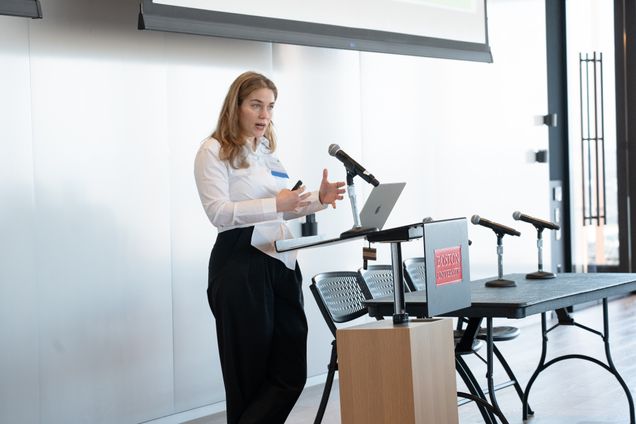CISE Hosts 11th Annual Graduate Student Workshop (CGSW 11.0)
Over 100 student and faculty attendees gathered on January 24th, 2025, for the 11th Annual Graduate Student Workshop hosted by the Center of Information and Systems Engineering (CISE). The day-long symposium featured doctoral students from different disciplines across Boston University’s College of Engineering presenting their original research.
“CGSW aims to bring together CISE students, faculty, and external speakers to foster inspiration, stimulate new research ideas, and create opportunities for high-impact collaborations,” Ayşe K. Coşkun, CISE Director and ECE Professor said in her opening remarks. From these types of events, there is a potential for collaboration and new groundbreaking research from workshop presenters as well as attendees.
CGSW 11.0 featured two plenary talks. Denis Daly, Senior Manager and Architect at Apple, spoke to workshop attendees about career opportunities in hardware and how hardware is a critical enabler of Apple’s products. Elli Ntakou (ENG ‘17), Systems Resilience and Reliability Manager at Eversource Energy, discussed innovative ways the energy industry is addressing recent changes and issues, including grid modernization and resilience. Ntakou also highlighted how she leveraged skills from her doctorate degree, advised by CISE faculty affiliate and professor Michael Caramanis (ME, SE), and applied these skills to her career in industry. 
An alumni panel discussion featuring Alexander Bulekov, Furkan Ercan, and Uroš Kuzmanović set the event apart, giving current students a chance to connect with industry professionals. These alumni offered invaluable insights, career guidance, and real-world perspectives to help students navigate their futures.
Bulekov, a security engineer at Amazon, emphasized the importance of aligning career choices with personal interests. “If you enjoy what you’re working on, look out for roles where you can continue that work,” he advised. Bulekov explained the tech industry is filled with examples of engineers who turned personal projects into groundbreaking careers. His emphasis on internships and independent work isn’t just about padding a résumé— it’s about proving creativity and a drive that employers value.
Echoing the importance of well-rounded experience, Ercan, a research scientist at Intel, discussed the intersection of academic and industry careers. He encouraged students to explore both paths to determine which aligns better with their goals. Beyond technical expertise, he emphasized that employers in engineering also seek strong soft skills, such as communication, adaptability, and collaboration—qualities that can set candidates apart in a competitive job market.
 Kuzmanović, the founder of BioSens8, shared how his desire to make a global impact shaped his career path. Because he wanted “to reach the most people,” commercialization became the natural next step. “Think big. What is the big problem you’re thinking about solving?” he challenged students. His advice highlighted the importance of ambition and problem-solving in career development, encouraging students to align their work to solve meaningful challenges that drive change.
Kuzmanović, the founder of BioSens8, shared how his desire to make a global impact shaped his career path. Because he wanted “to reach the most people,” commercialization became the natural next step. “Think big. What is the big problem you’re thinking about solving?” he challenged students. His advice highlighted the importance of ambition and problem-solving in career development, encouraging students to align their work to solve meaningful challenges that drive change.
The event was organized into five sessions: Advancements in Reinforcement Learning, Optimizations and Efficiency in Robotics, Task Allocation, Monitoring, and Control, Security and Data Centers, and Application Specific Innovations where 15 students shared their research with an audience who voted for best presentation. The criteria was based on speaker engagement and clarity of the presentation. Scores were tabulated and the winners are:
Qinzi Zhang (Advisor: Ashok Cutkosky) won the Best Presenter Award for his talk titled “Random Scaling and Momentum for Non-smooth Non-Convex Optimization.” Zhang’s research focused on improving optimization techniques, particularly in challenging scenarios involving non-smooth and non-convex problems. Her work has the potential to enhance performance in critical areas like machine learning and operations research.
The second-place winner was Kamran Vakil (Advisor: Alyssa Pierson) for his presentation, “Decentralized Drone Swaps for Online Rebalancing of Drone Delivery Tasks.” Vakil’s research focused on improving drone delivery systems by introducing a decentralized method for rebalancing tasks. His approach uses drone swaps to make task allocation more efficient and adaptable, addressing key challenges in the fast-growing field of autonomous delivery.
In third place was Abin Binoy George (Advisor: Sabrina Neuman) for his work titled “Co-Design of Mechanical & Computer Hardware for Robots.” George’s research focused on combining robotics and hardware design, aiming to create better integration between mechanical systems and computational hardware. By designing these components to work together seamlessly, his approach seeks to optimize robot performance.
We encourage CISE student affiliates to submit abstracts to present at next year’s CGSW 12.0. More information on the day’s events can be found here.